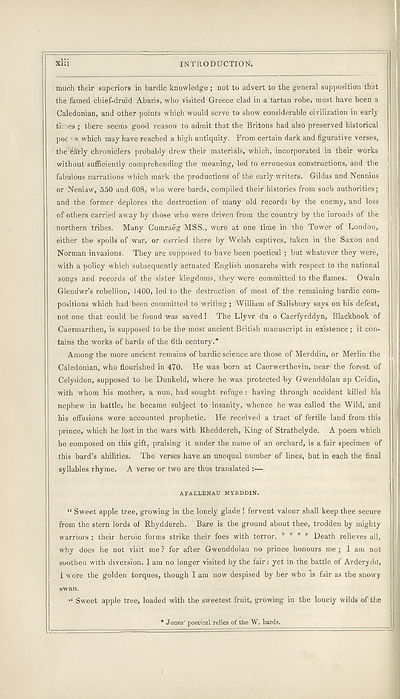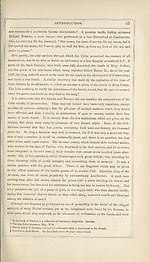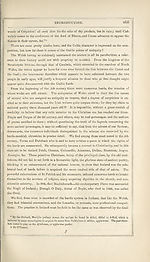Books and other items printed in Gaelic from 1871 to 1900 > Sar-obair nam bard Gaelach, or, The beauties of Gaelic poetry, and lives of the Highland bards
(54) Page xlii
Download files
Complete book:
Individual page:
Thumbnail gallery: Grid view | List view

xlii
INTRODUCTION.
much their superiors in bardie knowledge; not to advert to the general supposition that
the famed chief-druid Abaris, who visited Greece clad in a tartan robe, must have been a
Caledonian, and other points which would serve to show considerable civilization in early
ti; es; there seems good reason to admit that the Britons had also preserved historical
potv s which may have reached a high antiquity. From certain dark and figurative verses,
the:ilkrly chroniclers probably drew their materials, which, incorporated in their works
without sufficiently comprehending the meaning, led to erroneous constructions, and the
fabulous narrations which mark the productions of the early writers. Gildas and Nennius
or Neniaw, 550 and 608, who were bards, compiled their histories from such authorities;
and the former deplores the destruction of many old records by the enemy, and loss
of others carried away by those who were driven from the country by the inroads of the
northern tribes. Many Cumraeg MSS., were at one time in the Tower of London,
either the spoils of war, or carried there by Welsh captives, taken in the Saxon and
Norman invasions. They are supposed to have been poetical ; but whatever they were,
with a policy which subsequently actuated English monarchs with respect to the national
songs and records of the sister kingdoms, they w'ere committed to the flames. Owain
Glendwr’s rebellion, 1400, led to the destruction of most of the remaining bardic com¬
positions which had been committed to writing; William of Salisbury says on his defeat,
not one that could be found was saved! The Llyvr du o Caerfyrddyn, Blackbook of
Caermarthen, is supposed to be the most ancient British manuscript in existence; it con¬
tains the works of bards of the 6th century.*
Among the more ancient remains of bardic science are those of Merddin, or Merlin the
Caledonian, who flourished in 470. He was born at Caerwerthevin, near the forest of
Celyddon, supposed to be Dunkeld, where he was protected by Gwenddolau ap Ceidio,
with whom his mother, a nun, had sought refuge : having through accident killed his
nephew in battle, he became subject to insanity, whence he was called the Wild, and
his effusions were accounted prophetic. He received a tract of fertile land from this
prince, which he lost in the wars with Rhedderch, King of Strathclyde. A poem which
he composed on this gift, praising it under the name of an orchard, is a fair specimen of
this bard’s abilities. The verses have an unequal number of lines, but in each the final
syllables rhyme. A verse or two are thus translated :—
AFALLENAU MYftDDIN.
“ Sweet apple tree, growing in the lonely glade ! fervent valour shall keep thee secure
from the stern lords of Rhydderch. Bare is the ground about thee, trodden by mighty
warriors : their heroic forms strike their foes with terror. * * * * Death relieves all,
why does he not visit me ? for after Gwenddolau no prince honours me ; I am not
soothea with diversion. I am no longer visited by the fair: yet in the battle of Arderydd,
1 wore the golden torques, though I am now' despised by her who is fair as the snowy
swan.
Sweet apple tree, loaded with the sweetest fruit, growing in the lonely wilds of the
Jones' poetical relics of the W. bards.
INTRODUCTION.
much their superiors in bardie knowledge; not to advert to the general supposition that
the famed chief-druid Abaris, who visited Greece clad in a tartan robe, must have been a
Caledonian, and other points which would serve to show considerable civilization in early
ti; es; there seems good reason to admit that the Britons had also preserved historical
potv s which may have reached a high antiquity. From certain dark and figurative verses,
the:ilkrly chroniclers probably drew their materials, which, incorporated in their works
without sufficiently comprehending the meaning, led to erroneous constructions, and the
fabulous narrations which mark the productions of the early writers. Gildas and Nennius
or Neniaw, 550 and 608, who were bards, compiled their histories from such authorities;
and the former deplores the destruction of many old records by the enemy, and loss
of others carried away by those who were driven from the country by the inroads of the
northern tribes. Many Cumraeg MSS., were at one time in the Tower of London,
either the spoils of war, or carried there by Welsh captives, taken in the Saxon and
Norman invasions. They are supposed to have been poetical ; but whatever they were,
with a policy which subsequently actuated English monarchs with respect to the national
songs and records of the sister kingdoms, they w'ere committed to the flames. Owain
Glendwr’s rebellion, 1400, led to the destruction of most of the remaining bardic com¬
positions which had been committed to writing; William of Salisbury says on his defeat,
not one that could be found was saved! The Llyvr du o Caerfyrddyn, Blackbook of
Caermarthen, is supposed to be the most ancient British manuscript in existence; it con¬
tains the works of bards of the 6th century.*
Among the more ancient remains of bardic science are those of Merddin, or Merlin the
Caledonian, who flourished in 470. He was born at Caerwerthevin, near the forest of
Celyddon, supposed to be Dunkeld, where he was protected by Gwenddolau ap Ceidio,
with whom his mother, a nun, had sought refuge : having through accident killed his
nephew in battle, he became subject to insanity, whence he was called the Wild, and
his effusions were accounted prophetic. He received a tract of fertile land from this
prince, which he lost in the wars with Rhedderch, King of Strathclyde. A poem which
he composed on this gift, praising it under the name of an orchard, is a fair specimen of
this bard’s abilities. The verses have an unequal number of lines, but in each the final
syllables rhyme. A verse or two are thus translated :—
AFALLENAU MYftDDIN.
“ Sweet apple tree, growing in the lonely glade ! fervent valour shall keep thee secure
from the stern lords of Rhydderch. Bare is the ground about thee, trodden by mighty
warriors : their heroic forms strike their foes with terror. * * * * Death relieves all,
why does he not visit me ? for after Gwenddolau no prince honours me ; I am not
soothea with diversion. I am no longer visited by the fair: yet in the battle of Arderydd,
1 wore the golden torques, though I am now' despised by her who is fair as the snowy
swan.
Sweet apple tree, loaded with the sweetest fruit, growing in the lonely wilds of the
Jones' poetical relics of the W. bards.
Set display mode to: Large image | Transcription
Images and transcriptions on this page, including medium image downloads, may be used under the Creative Commons Attribution 4.0 International Licence unless otherwise stated. ![]()
| Permanent URL | https://digital.nls.uk/109809721 |
|---|
| Description | Out-of-copyright books printed in Gaelic between 1631 and 1900. Also some pamphlets and chapbooks. Includes poetry and songs, religious books such as catechisms and hymns, and different editions of the Bible and the Psalms. Also includes the second book ever published in Gaelic in 1631. |
|---|

